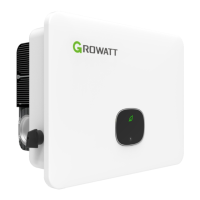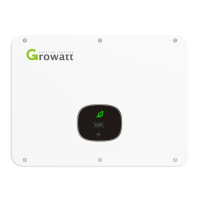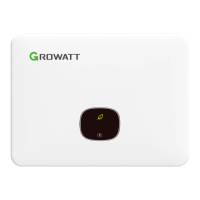What should I do if my Growatt Inverter shows Warning 409?
- NNatalie GarciaAug 29, 2025
If your Growatt Inverter displays Warning 409, restart the inverter. If the error message persists, please contact Growatt support.

What should I do if my Growatt Inverter shows Warning 409?
If your Growatt Inverter displays Warning 409, restart the inverter. If the error message persists, please contact Growatt support.
What to do if my Growatt MID TL3-XH is showing Warning 407?
If your Growatt Inverter displays Warning 407, restart the inverter. If the error message persists, please contact Growatt support.
How do I troubleshoot Warning 406 on a Growatt Inverter?
If your Growatt Inverter displays Warning 406, restart the inverter. If the error message persists, please contact Growatt support.
What to do if my Growatt MID TL3-XH Inverter is showing Warning 219?
If your Growatt Inverter displays Warning 219, restart the inverter. If the error message persists, please contact Growatt support.
What should I do if I see Warning 423 on my Growatt MID TL3-XH Inverter?
If your Growatt Inverter displays Warning 423, restart the inverter. If the error message persists, please contact Growatt support.
How do I fix Warning 217 on my Growatt MID TL3-XH Inverter?
If your Growatt Inverter displays Warning 217, restart the inverter. If the error message persists, please contact Growatt support.
How do I resolve Error 307 on my Growatt Inverter?
If your Growatt Inverter displays Error 307, check the connection of the communication cable. If the error message persists, please contact Growatt support.
What to do if my Growatt MID TL3-XH Inverter is showing Error 302?
If your Growatt Inverter displays Error 302, after shutdown, check the AC wiring. If the error message persists, please contact Growatt support.
What should I do if my Growatt MID TL3-XH is showing Error 201?
If your Growatt Inverter displays Error 201, restart the inverter. If the error message persists, please contact Growatt support.
How to fix Error 303 on a Growatt Inverter?
If your Growatt Inverter is showing Error 303, check if the PE cable is securely connected. If the error message persists, please contact Growatt support.
| Number of MPPTs | 2 |
|---|---|
| Number of DC Inputs per MPPT | 2 |
| Nominal Grid Frequency | 50 Hz / 60 Hz |
| THDi | < 3% |
| DC Switch | Yes |
| Topology | Transformerless |
| Nominal AC Voltage | 230V |
| AC Voltage Range | 180V - 280V |
| Operating Temperature Range | -25°C to 60°C |
| Communication | WiFi/GPRS (Optional) |
Specifies the validity of the manual and lists supported device types.
Identifies the target audience and provides contact information for support.
Explains warning symbols, safety labels, and provides a glossary of terms.
Details the inverter's design, MPP trackers, and key product features.
Provides comprehensive safety guidelines for installation, operation, and maintenance.
Describes the physical components of the inverter and its status indicators.
Presents the physical dimensions and weight specifications of the inverter models.
Lists the components included in the inverter package and instructions for checking completeness.
Outlines essential requirements for inverter installation, including location and environmental conditions.
Details the procedure for installing the wall-mounting bracket and the inverter.
Highlights critical safety precautions before and during electrical connections.
Provides step-by-step instructions and warnings for connecting the AC power.
Details the DC input wiring procedures and associated safety warnings.
Explains conditions and steps for connecting a bidirectional DC/DC box.
Describes how to connect and disconnect the signal cable for communication.
Explains the importance and method of grounding the inverter for safety.
Details how to use external devices for active power control and export limitation.
Explains Demand Response Modes and their application via a 16-pin socket.
Covers Ground Fault Circuit Interrupter functionality and installation advice.
Details the Arc-Fault Circuit Interrupter function, safety, and operation steps.
Explains how to enable and configure the inverter's backup mode with a battery.
Provides the sequence of steps for commissioning the inverter after installation.
Describes the normal operating state of the inverter when connected to the grid.
Explains the inverter's behavior and indicators during a system or inverter failure.
Guides on starting the inverter and using the touch button for interface navigation.
Details how to configure general settings like display language, date, and time.
Explains how to access and configure advanced settings, including export limitation and backup mode.
Describes the COM port functions, pin assignments, and connection for monitoring.
Explains the usage of the USB-A port for connecting monitoring modules and firmware updates.
Recommends cleaning the heat sink to improve heat dissipation and prevent performance reduction.
Provides instructions for cleaning the inverter's enclosure, display, and indicators.
Outlines the correct sequence of steps for safely powering on the inverter.
Details the procedure for safely powering off the inverter and its components.
Lists information required to provide technical assistance for error messages.
Provides a table of system warnings, their descriptions, and troubleshooting steps.
Lists system error codes, their descriptions, and recommended troubleshooting actions.
Step-by-step guide on how to safely remove the inverter from its mounting.
Provides guidelines for the environmentally responsible disposal of the inverter.
Lists essential information required for contacting technical support for product issues.












